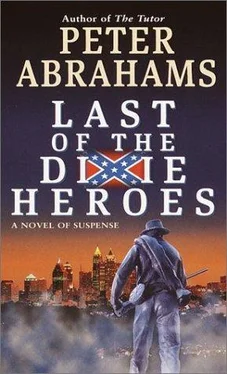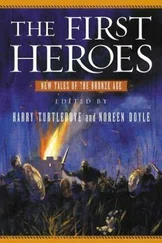Peter Abrahams - Last of the Dixie Heroes
Здесь есть возможность читать онлайн «Peter Abrahams - Last of the Dixie Heroes» весь текст электронной книги совершенно бесплатно (целиком полную версию без сокращений). В некоторых случаях можно слушать аудио, скачать через торрент в формате fb2 и присутствует краткое содержание. Жанр: Триллер, на английском языке. Описание произведения, (предисловие) а так же отзывы посетителей доступны на портале библиотеки ЛибКат.
- Название:Last of the Dixie Heroes
- Автор:
- Жанр:
- Год:неизвестен
- ISBN:нет данных
- Рейтинг книги:4 / 5. Голосов: 1
-
Избранное:Добавить в избранное
- Отзывы:
-
Ваша оценка:
- 80
- 1
- 2
- 3
- 4
- 5
Last of the Dixie Heroes: краткое содержание, описание и аннотация
Предлагаем к чтению аннотацию, описание, краткое содержание или предисловие (зависит от того, что написал сам автор книги «Last of the Dixie Heroes»). Если вы не нашли необходимую информацию о книге — напишите в комментариях, мы постараемся отыскать её.
Last of the Dixie Heroes — читать онлайн бесплатно полную книгу (весь текст) целиком
Ниже представлен текст книги, разбитый по страницам. Система сохранения места последней прочитанной страницы, позволяет с удобством читать онлайн бесплатно книгу «Last of the Dixie Heroes», без необходимости каждый раз заново искать на чём Вы остановились. Поставьте закладку, и сможете в любой момент перейти на страницу, на которой закончили чтение.
Интервал:
Закладка:
“On me?” said Sonny Junior, turning to Roy, the belt in his hand. Roy had a memory of that barn up in Tennessee, Sonny’s barn now but the way it was long ago, with those shafts of light crisscrossing over two little boys, way below, and blood on the straw.
“Correct,” said Roy. “On you.”
Roy and Sonny Junior faced each other.
“Sorry, Uncle Sonny,” Rhett said. “Didn’t mean to hurt your car.”
Sonny Junior gazed down at the boy. He started to smile, a smile that got bigger and bigger. “Hell, boy, can’t hurt a demolition derby car-it’s already demolished, that’s the whole deal.” He started laughing. Then Rhett was laughing too, and finally Roy. Sonny Junior reached down, cuffed Rhett on the back of the head, not too hard. “Liked your hair better the old way, killer,” he said. “Don’t be forgettin’ your uncle Sonny.”
“Never,” said Rhett.
Down below, Roy drove in an unending line of cars along the airport feeder. Up above, planes rose into the sky one after the other, higher and higher until they disappeared into that blue sky. It was like some automatic system, some immense machine-present-day life itself, was how Lee would see it, Roy knew that-all set up for taking Rhett away from him.
“We’ll just make it,” Roy said.
“I don’t care,” said Rhett. “You think I want to go?”
“Everything’s going to be all right. Call home-call me anytime you like.”
No reply.
“You know the number?”
“Yeah.”
“What is it?”
Rhett said the number.
“You have to dial one and then the area code first. Do you know the area code?”
“No.”
“Four-oh-four. Think you can remember, or want me to write it down?”
Rhett didn’t answer. Roy glanced over and saw Rhett writing 404 on his hand in ink.
Marcia was where she’d said she’d be, standing on the curb by the American Airlines sign, checking her watch. No sign of Dr. Grant Nordman, probably waiting inside. Pulling over, Roy tried to think of the last words he should say to Rhett. I love you, probably, or maybe just Love you. Didn’t want to burden the boy with too much emotion, but at the same time Everything happened quickly.
Rhett got out of the car before Roy had a chance to say anything.
Roy got out too, but a cop hurried over immediately: “Can’t park here.”
And Marcia was dressed like he’d never seen, could have been some high-society lady.
She said: “Okay, then,” or something like that. And then to Rhett, “Why, you’re filthy.”
The cop repeated what he’d said, but Roy moved around the car anyway, up on the curb, turned Rhett around, gave him a kiss on the top of his head, a kiss meant for his forehead, the middle of his forehead, that was what he’d had in mind, but off-target in all the confusion.
Marcia took Rhett’s hand. “The flight’s on time.” She looked at Roy. “I left the phone number and address on your machine.”
Roy didn’t know what she was talking about. Rhett stood beside her, eyes on Roy.
“Bye, son,” Roy said.
Rhett nodded.
Marcia took him inside.
The cop said what he had to say one last time.
At home, Roy listened to Marcia’s message on the machine, wrote down the New York address and phone number, stuck them on the fridge. There were two other messages, both from Ms. Steinwasser, asking him to call the school. Roy had just finished listening to them when the phone rang. Roy picked it up, thinking, Rhett, trying out one of those plane phones.
But it was some man he’d never heard of. “Are you aware of what happened at the school today? That little scumbag of yours ambushed my son. Cody’s in bed right now-practically knocked unconscious.”
“With what?” Roy said.
“What the hell kind of question is that? Your son walked up to my son and punched him right in the face.”
“I’m sure you know there’s been provocation,” Roy said; at the same time remembering Rhett running out of the school five minutes early, his skinned knuckles, and the boxing lesson in the barn before that. All made sense, but much too late, maybe the only way things made sense to him.
“Now I see where it comes from,” the man said. “It may interest you to know I’ve got an office full of lawyers just waiting to take a bite out of the likes of you.”
“Are they licensed to practice in New York?” Roy said, and hung up.
Roy didn’t have beer, didn’t have anything to drink. Didn’t want beer anyway, wanted Old Grand-Dad, so he went out and got some. Never even tasted Old Grand-Dad, but that was what he wanted. Drank a bit, then a little bit more. Much later, late at night, sitting in the darkened kitchen with the gun on his lap again, he decided to take another crack at the rebel yell. He rose, laid the gun on the table, took a deep breath-had no trouble taking it, for some reason, filling himself with air like never before-then yelled that rebel yell at the top of his lungs. At the top of his lungs, his throat free and open, all his strength turned into sound. His body went cold from it. The house shook from it. And after, in the silence, he pictured his little house from high above, a tiny square in an endless grid of tiny squares, the rebel yell escaping through the roof, rising into the night.
EIGHTEEN
Wearing the uniform with the little hole in the front and carrying the leather-bound chest on his shoulder, Roy climbed a slope on the east side of the battlefield at Chickamauga. With the sun just coming up, he walked in shadow, following a suggestion of a path through grass bent with dew. The soldiers of 1863 had fought over this very slope, a slope, as Jesse explained when Roy called for directions, not exactly within the military park itself, the Park Service almost always forbidding reenactments on hallowed ground, but on private land close by, rented for the weekend with money from registration fees. The wind blew in the trees, a cool wind for the time of year, but other than that there was no sound, just as it might have been, Roy thought, back then.
An obvious thought-he knew it at the time-but a few steps from the top of the rise, Roy heard a sharp snap, and looking up saw the Union flag flying straight out against the sky. From his angle he couldn’t see any more, just the flag in unmarred blue, an empty sky as it might have been, back then. A little chill, perhaps from the cool wind, ran down his shoulders and back. Roy felt another one when he realized he’d thought of the Stars and Stripes as the Union flag.
Roy rose out of the shadow and into the pearly postdawn light, head, body, legs, in three steps. Thick woods lined the horizon, mist rising off the crowns of the trees. Closer lay a field with three or four rows of tents, the nearest tent, about ten yards away, flying the flag high above. Closer still stood a Porta Potti and next to it a man in blue, his fly unbuttoned, pissing in Roy’s direction. He gazed at Roy-a bearded man with sergeant’s stripes on his sleeve, as big as Sonny Junior but with a paunch, hanging freely at the moment-and said: “Little lost there, Reb?”
Flaps opened here and there, other men half-dressed in blue emerged, stretching, brushing their teeth. “I’m looking for the… other camp,” Roy said.
“Thought so,” said the man. “I can tell you’re an ace already.”
“I don’t get you.”
“At reenacting,” said the man, shaking off. “Real rebs couldn’t read maps neither, ninety percent of them being illiterate.”
“Does it take being literate to know you piss on the inside of these things?” Roy said.
The man’s cheeks reddened above his beard. He started buttoning up, had a little trouble, was forced to look down to do it. Uncircumcised, Roy noticed, and was thinking to himself, Another period touch? when a man-no, a large boy-came out of the nearest tent, a red-white-and-blue drum slung over his shoulder.
Читать дальшеИнтервал:
Закладка:
Похожие книги на «Last of the Dixie Heroes»
Представляем Вашему вниманию похожие книги на «Last of the Dixie Heroes» списком для выбора. Мы отобрали схожую по названию и смыслу литературу в надежде предоставить читателям больше вариантов отыскать новые, интересные, ещё непрочитанные произведения.
Обсуждение, отзывы о книге «Last of the Dixie Heroes» и просто собственные мнения читателей. Оставьте ваши комментарии, напишите, что Вы думаете о произведении, его смысле или главных героях. Укажите что конкретно понравилось, а что нет, и почему Вы так считаете.












